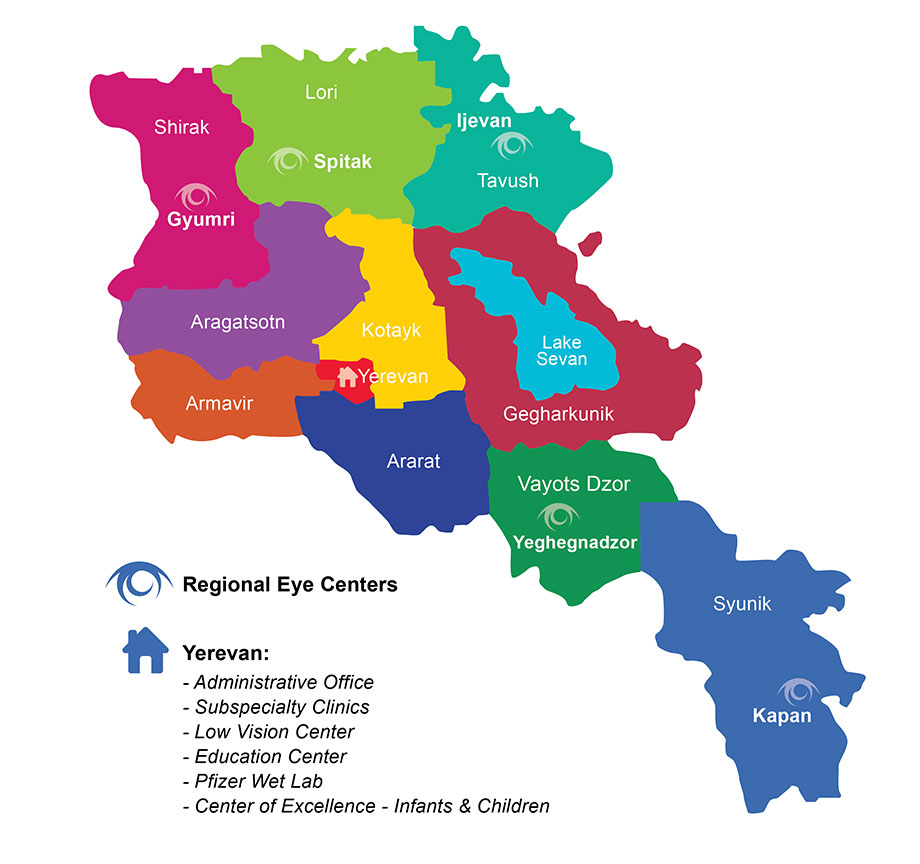With a very simple planned gift you can help the EyeCare Project Bring Sight to Armenian Eyes and really make a difference. Learn how meaningful — and how easy — it is to make a planned gift, which will make your generosity last for generations.
Perhaps what matters to you most is ensuring that the Armenian EyeCare Project continues our mission to provide quality eye care to all Armenians and to eliminate preventable blindness. Or maybe what’s most important to you is enhancing your family’s financial security. Giving a planned gift can help you accomplish both.
From naming the Armenian EyeCare Project in your will, to charitable trusts, retirement plan gifts and gift annuities, there are many giving options to choose from. Contact your financial advisory or attorney so they can help you and your family understand all of the planned giving options and their benefits. You may also contact us for more information. Your lasting legacy and compassion will ensure that the Armenian EyeCare Project programs will continue for generations to come, while also providing some financial benefits to you and your family.
What is Planned Giving?

A planned gift is any major gift, made during the donor’s lifetime or at death as part of a donor’s overall financial and estate planning. Less commonly known as gift planning, planned giving is an area of fund development that refers to several types of specific gifts that can be funded with cash, equity, or property.
Planned giving is a method of supporting charitable nonprofits, which enables donors to make larger gifts than they could make from their income. Some planned gifts provide a life-long income to the donor. Other planned gifts use estate and tax planning techniques to provide for a charity that maximizes the gift and/or minimize its impact on taxes to the donor’s estate.
Annual charitable giving is based on a donor’s discretionary income. It is sometimes budgeted, but is not planned considering the goals of the donor’s financial planning or tax benefits.
Whether a donor uses cash, appreciated securities/stock, real estate, artwork, partnership interests, personal property, life insurance, a retirement plan, etc., the benefits of funding a planned gift make this type of charitable giving attractive to both the donor and the charity.
There are three types of planned gifts
- Outright gifts, for example appreciated assets and cash.
- Gifts that return income or other financial benefits to the donor in return for the contribution.
- Gifts that are payable upon the donor’s death.
What gift plans return income to donors?
- Charitable gift annuities make fixed payments, beginning when the gift is made, an immediate-payment gift annuity, or at a later date, a deferred or flexible gift annuity.
- Charitable remainder unitrusts and annuity trusts are individually managed trusts that pay the beneficiaries either a fixed percentage of trust income or a fixed dollar amount.
What are the tax benefits of planned gifts?
- Donors can contribute appreciated property — securities, real estate, art — and receive a charitable deduction for the full market value of the asset. Donors pay no capital gains tax on the transfer.
- Donors who establish a life-income gift receive a tax deduction for the full, fair market value of the assets contributed, less the present value of the income interest retained. If they fund their gift with appreciatedproperty they pay no upfront capital gains tax on the transfer.
- Gifts payable to a charitable nonprofit upon the donor’s death — a bequest or a beneficiary designation in a life insurance policy or a retirement account — do not generate a lifetime income tax deduction for thedonor, however, they are exempt from estate tax.
- Always review with your financial advisor or accountant to determine the type and amount of tax deductions you will receive from a planned gift.
Why should I make a Planned Gift to the EyeCare Project?
We hope you will consider including the Armenian EyeCare Project in your estate or financial planning. Planned giving considers the donor’s personal and financial goals. The donor may want to ensure that the EyeCare Project continues to provide eye care for the people of Armenia over many generations. Additionally, it is important for the donor to enhance her family’s financial security. Planned giving enables the donor to accomplish both of these goals.
There are many types of planned gifts from which the donor can choose depending on their financial goals. Your lasting legacy and compassion will ensure that EyeCare Project programs will continue while providing financial benefits to you and your family. These gifts include naming the EyeCare Project in your will, charitable trusts, retirement plan gifts and gift annuities.
Make a transformational gift to the EyeCare Project today
- A planned gift enables you to support the Project and accomplish your financial goals.
- A planned gift allows you to be more generous than you ever thought possible.
- A planned gift is easier to arrange than you think.
Through a planned gift you can be more generous than you ever thought possible. You can:
- Make the EyeCare Project a beneficiary of your will or trust, creating a gift that costs you nothing during your lifetime.
- Give appreciated stocks, bonds or mutual fund shares.
- Donate life insurance you no longer need.
- Donate real estate and other assets.
- Receive lifetime income back from the EyeCare Project in return for your gift.
Bring hope and sight to Armenians for generations to come with a planned gift
Remembering the EyeCare Project in your financial planning contributes to the Project’s long-term financial strength, ensuring access to eye care for the people in Armenia.
There are many options for your planned gift
There are many options available for donors who wish to include the Armenian EyeCare Project in their long range financial planning. The simplest is a bequest in your will. Or, you can establish a trust that will enable you to contribute to the EyeCare Project while providing you with income, helping you meet your current and long-term financial and philanthropic needs. You also can designate the EyeCare Project as a beneficiary of your retirement plan, a life insurance policy or of a bank account or security.
To learn how simple yet significant it is to make a planned gift
- Call the EyeCare Project at 949-933-4069
- E-Mail [email protected]
- Or go to www.eyecareproject.com to request more information.
NOTE: The information on our website will help you get started, but it is very general and does not apply to individuals. Always consult your tax, legal or financial advisors concerning the specific details of a planned gift to the Armenian EyeCare Project and to determine which approach is best for you.







